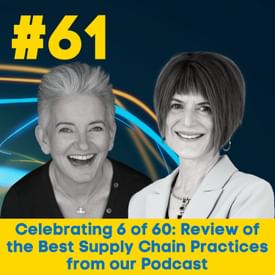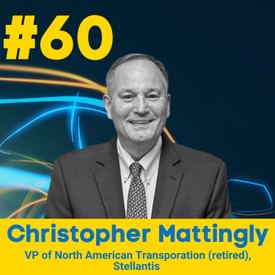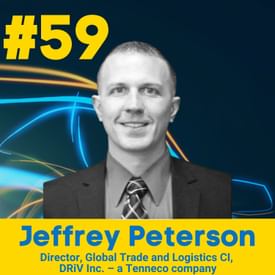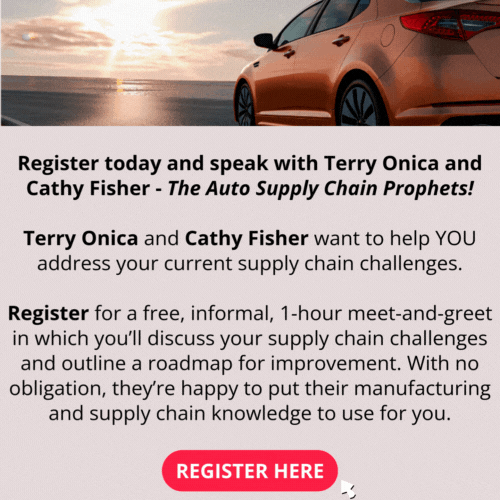In the latest episode of the Auto Supply Chain Prophets podcast, hosts Cathy Fisher, Terry Onica, and Jan Griffiths dive into the dynamic realm of ESG (Environment, Social, and Governance) standards in the automotive supply chain. Their guest, Alexis Scipio, a seasoned professional with extensive experience in procurement and supply chain, lends her invaluable insights to illuminate the path toward embracing ESG principles to enhance sustainability and ethical practices within the automotive industry.
In an in-depth discussion, the hosts and Alexis explore the profound significance of ESG in the automotive sector. Drawing on her wealth of experience, Alexis navigates the complex landscape of global ESG standards, highlighting challenges stemming from diverse agreements and frameworks that can create confusion.
The conversation also underscores the importance of cross-functional collaboration and leadership in addressing ESG requirements. Alexis emphasizes the involvement of every function in ESG implementation, while also emphasizing the transformative potential of Supplier Relationship Management (SRM) in fostering deep partnerships and engagement with suppliers.
In this engaging episode, listeners gain valuable insights into ESG's multifaceted nature, its crucial relevance to the automotive sector's global supply chains, and the concrete steps leaders can take to align their organizations with ESG principles. With a passionate emphasis on partnership, engagement, and education, the episode concludes by inspiring automotive leaders to champion sustainable and ethical practices for a brighter future.
Themes discussed in this episode:
- Significance of ESG in the automotive industry
- Complexity of global ESG standards
- Importance of cross-functional collaboration in effectively addressing ESG requirements
- ESG’s broader impact on the automotive supply chain
Featured on this episode:
Name: Alexis Scipio
Title: ESG Strategy Consultant
About: Alexis Scipio is a seasoned ESG aficionado and supply chain professional with over 15 years of experience in the automotive industry. She’s the Founder of The Thrive Point LLC. and a certified diversity specialist who passionately integrates ESG principles into business processes.
Connect: Linkedin
Episode Highlights:
[03:31] Defining ESG and Navigating Complex Frameworks: The conversation not only defines ESG (Environment, Social, and Governance) standards but also delves into the complexity arising from numerous agreements and frameworks referencing ESG.
[04:55] Significance of ESG in the Automotive Sector: The podcast underlines the profound importance of ESG in the automotive industry. The discussion revolves around how ESG considerations influence various aspects of the sector's operations and future direction.
[07:24] Impact on the Supply Chain: The hosts and Alexis delve into the broader impact of ESG on the automotive supply chain. They discuss how ESG requirements extend throughout the supply chain and require collaboration from multiple functions.
[15:46] Importance of Cross-Functional Collaboration: Alexis emphasizes the significance of cross-functional collaboration in effectively addressing ESG requirements. Alexis highlights the need for every function to play a role in ESG implementation, stressing its broader impact on the automotive supply chain.
[16:50] Fostering Value through an ESG Mindset: Alexis reflects on the transformative power of viewing ESG as a value-driven proposition rather than an added responsibility. By aligning ESG efforts with quality improvement, she emphasizes that this shift in perspective can reframe the role of ESG within automotive operations.
[22:50] Insights into ESG Implementation: Alexis’ expertise shines as she provides actionable advice for starting the ESG journey within the automotive industry. Addressing leaders and listeners in supply chain operations and C-suite roles, Alexis emphasizes the significance of proactive engagement.
Top Quotes:
[13:19] Alexis: “There's true value in ESG in automotive.”
[18:31] Alexis: “There's a direct correlation between people being happy and quality.”
[20:52] Alexis: “I find real value-add in making sure that you, as a buyer or supplier-facing role, know the culture of that company, knows and partners with them on technology, making sure that they're heard, making sure that they're engaged.”
[21:23] Alexis: “I mean, these are the suppliers. These are the relationships that will withstand pandemics, recessions, they will be there for you based on the relationship that you've cultivated.”
[23:40] Alexis: “So, my real request is for OEMs to step up, to make sure that they're partnering along with their suppliers to make sure that they are being partners in sustainability.”
[Transcript]
Jan Griffiths:Welcome to the Auto Supply Chain Prophets podcast where we help you prepare for the future in the auto supply chain. I'm Jan Griffiths, your co-host and producer.
Cathy Fisher:I'm Cathy Fisher, your podcast host. Our mission is to help automotive manufacturers recognize, prepare for, and profit from whatever comes next in the auto supply chain.
Terry Onica:I'm Terry Onica, your podcast host. Will be giving you best practices and key supply chain insights from industry leaders,
Jan Griffiths:Because the auto supply chain is where the money is, let's dive in.
Jan Griffiths:Hello, and welcome to another episode of Auto Supply Chain Prophets. Let's check in with my co-hosts, Cathy Fisher and Terry Onica. Terry, what have you been up to lately?
Terry Onica:Well, it's not so much about what I've been up to lately, but I'm super excited. My Wayne State University mentee from last year just started her job in supply chain at American Axle. So, I'm super excited for her.
Jan Griffiths:Oh, that's great. I hear a lot of good things about American Axle, you know. What about you Cathy Fisher? What have you been up to?
Cathy Fisher:I have been growing my leadership skills. So this week, I'm actually taking a course on Awakening Conscious Leadership, and leadership starts from within, which has been really exciting to learn some practices to develop leadership from the inside out.
Jan Griffiths:Oh, you know what, we should totally do a podcast on that when you're ready, because that's my jam. I love that. Should we do that?
Cathy Fisher:Yeah, absolutely. I'm down with it. Sure.
Jan Griffiths:Okay. Well, I celebrated five years, I walked away from my corporate job. Yeah, five years ago. Yeah, it was really weird. I walked into a restaurant. And I thought I hadn't been there for a while. And I thought, well, what was the last time I was here? And I thought, oh! it was my leaving party, from my corporate job. So, talking about leaving your corporate career and doing your own thing, and being mission-driven, and vision-driven, and all those things that I love to talk about. Our guest did exactly that. She had a stellar career, stellar. She worked for Cummins, she was a buyer with Mercedes, I mean, awesome career, right? This woman would have been a rock star in a major corporation. But nope, she decided to go and step out on her own. And with that, let's welcome Alexis Scipio to the show. Hi, Alexis.
Alexis Scipio:Hi Jan, Terry, Cathy. Thank you for having me.
Jan Griffiths:It's great to have you with us today. So, tell us a little bit Alexis about this story. I mean, come on, Cummins, Mercedes, and then out. What's that all about?
Alexis Scipio:Great companies and ones that I really I hold dearly to my heart. I have 15 years of manufacturing experience primarily in the automotive space. I did step away for a couple of years but came back because I love it. And I'm primarily in procurement and supply chain. I decided to separate because I just saw a real need in the market to help suppliers wrap their arms around this ESG. And it's a lofty topic, it takes a lot of heavy lifting. But I felt like I was best positioned to answer that call. So, out of that was birthed, the Thrive Point.
Cathy Fisher:Excellent.
Jan Griffiths:That's amazing, amazing story.
Cathy Fisher:So Alexis, tell us what is ESG? We've been hearing this buzzword all around, what is that?
Alexis Scipio:ESG is Environment, Social, and Governance. And what it really is, is a framework that helps companies assess themselves against various sustainability and ethical factors, their business processes, and performance. What it really is, is topics that we're very familiar with; it's corporate responsibility, it's right environments, all these terms we're very familiar with - it's risk mitigation, risk management, it's contingency planning, it's conflict materials, labor rights. It's just so broad. And there's so many layers to it. What I do like to emphasize is that there's not this one document that has a global standard that defines what is sustainable and what is not sustainable, or what is ethical behavior and what is not ethical behavior. With my latest research, there are over 725 framework agreements globally, that reference ESG. And I really believe that's telling to why there seems to be such confusion, there's competing measures, conflicting measures, and criteria. So depending on the industry you're in, some of those agreements will apply to you or they all could apply to you.
Cathy Fisher:What type of ESG - let's say requirements or agreements - are relevant specifically for automotive manufacturers?
Alexis Scipio:If you think of ESG as a principle this convergence of the global world saying there's a place where companies can remain profitable, you can have profitability, and still be a good steward to your resources, still care about social justice, right? You're trying to find that sweet point where both of those things can thrive, all ESG standards that will reference environment, social, and governance will have relevance in the automotive world. And in my view, the automotive world should be the first, since we're, you know, talking about technology here. We should be an early adapter to ESG culture and principles. I will say that the "E," the environment, gets a lot of light, but rightfully so. The greenhouse gas emissions and carbon neutrality, and that march to 2030 under the Paris act all get a lot of focus. And even recently, in Europe, there's been actual litigation for companies. ExxonMobil in Europe was sued by an NGO because they didn't meet their emission standards, right? And this is huge! It sets a precedence for companies being held accountable for the targets that they set and publish to their stakeholders, to their customers. So, the "E" gets a lot of focus. But I also believe that there's a lot of things that we're doing in our day-to-day business that also don't get the visibility they should. For the "S," the social piece, this could look like your employee surveys, these engagement tools that you use to engage with your employee base. This could look like your board diversity, your board composition - how many women do have versus men, are minorities represented? This could also look like everyday things that you report to DHEC and OSHA, like workplace injuries, like the demographics on your employees. So, this is a large topic, and there's so many places that automotive can find value in it.
Cathy Fisher:Didn't they add ESG into the MMOG/LE assessment criteria now?
Terry Onica:Yes, they absolutely added ESG into the MMOG/LE assessment criteria. So, now suppliers need to consider that when they're building their strategy for supply chain at the plant. So, Alexis, one of the things that I wanted to mention, first, that is one of our 24 Essential Supply Chain Processes. So, it's so exciting to be able to talk about one of our processes. But what can automotive suppliers do to prepare for ESG in the supply chain?
Alexis Scipio:To add a little context to your question, Terry, I wanted to give a little story. Effective January 2023, Germany rolled out the Supply Chain Due Diligence Act. And Germany was very smart. They said, "We are light years ahead of other countries in terms of sustainability, and what can we do to help move that needle globally?" So, they looked to their largest companies, and those were companies that employ more than 3000 people headquartered in Germany. And they said; not only, not only you, dear companies, but all of your subsidiary locations — whether you're in Indianapolis, whether you're in South Africa —are going to comply with this Supply Chain Due Diligence Act and their supply chains. So, this act asked for complete transparency all the way down the supply chain. Sometimes, we used to be concerned about that finished part, if we were lucky, we might have went to the Tier Two. But now, we're equally as responsible all the way down to that raw material mine and making sure that product is being manufactured sustainably, that people are being treated properly in terms of labor rights. And that's a big lift. It's a huge lift for a lot of people in a real mindset shift. Because we're now saying that the standards in the US and what appears to be sustainable are going to be unilaterally applied to Cambodia, or China, or India. And we just know that the standards for what is environmentally friendly is just different in these regions. We need to get prepared, and I'm a huge fan of the 24 Essential Supply Chain Processes. I personally believe that if you were to look at each sub-topic, not just the pillars, not just that high-level topic, but each sub-topic, you can find a place to look through the lens of ESG.
Terry Onica:One of the things that I find in automotive is; in supply chain, we inherently, I think, should be ready for ESG. Because if you think about Lean Manufacturing, it was all about eliminating waste. But I'm really concerned that we're not because people didn't take that seriously, or they stretched that to look about how to just cut costs and not really run the operations more efficiently. What do you think?
Alexis Scipio:I totally agree. I heard a gentleman two years ago, so I didn't coin this myself, refer to "ESG," Environment, Social and Governance as "PPP," which is Product, People, and Policy. And I think that's just so telling. I think that takes away a bit of the weight of this lofty "ESG" term. Because if you're concerned about how your product is manufactured, and you know that well you know that through the supply chain knowledge and knowing the impact of that product manufacturing process on the environment. If you know your people well, how we engage together, not just your direct employees, but we're talking about your supplier engagement. We're talking about your stakeholders and your customer, what they find important. I truly believe that the automotive industry should be early adapters at this. Lean Manufacturing is a great example that there's definitely areas where we can improve upon, especially with that social piece. I can tell you that maybe 10 years ago, I exited automotive for a couple of years, I went to work for a company that manufactured polypropylene plastics, and they were based in Dubai. And I went on a supplier visit. And on the supplier visit, it was in the neighboring country, Oman, and there was this beautiful plant. I mean, it was you know, gated and garden did look like an oasis. So, I was really there to assess those Lean Manufacturing terms that you've referenced, Terry. But in that time, I was being chauffeured to my hotel after doing an audit that day. And the driver showed me a small group of girls waiting for the bus to go to the dorm. He's referred to it as, and these women had on the logo from the supplier. So I asked, I said, "Do they all live together?" And he was like, "Yes, it's a dorm," and he said, we have this wonderful program that allows women from Northern Africa to come and to work for us. Food is covered, room and board are covered. And this is a great opportunity because they can save, you know, money and send it back home to their families. And it made me think when he led with room and board are covered, are these women making a livable wage? You know, what's really going on here? So, then he drove me past the dorm because again he's super proud of this initiative, right? He drove me past this dormitory. And it was vastly different than that, like, oasis that I had just thought the plant. So I had major pause about this. And when I went back to Dubai, I escalated it to my manager, and eventually, they escalated an investigation and kind of turned down that source, and amped up our dual-source and brought in a third source, and we had an exit strategy. But Terry, one of the things that really resonates with me and I often think back on is if I, as someone that identifies as female, and if I ,as someone that is African American, and has a history of being tied to slavery, hadn't seen that through my lived experience. Would I have even noticed that, right? Would I've even had a pause in that moment? And I think that speaks to the importance of diversity in teams, diversity in your leadership and boards. Because you really need that diversity of thought, where my male counterpart could've very well saw that is a fabulous program. And so, I'm cut to three years later, I exit the plastics back into automotive, my heart. And I hear that one of the major players in plastics actually had some very unfavorable press around a topic like this— indentured servitude is what it's referred to. And it made me think that was risk mitigation. You know, ESG is risk mitigation. When a brand falls in unfavourable press, you have to get external counsel in a lot of places. It's really costly to brand reputation, and to your market share. So, there's true value in ESG in automotive, I think it's best positioned to your point to really meet this.
Cathy Fisher:So, Alexis, how can automotive suppliers begin to address these ESG requirements and make sure that they're prepared to support their automotive customers who may be mandating these requirements?
Alexis Scipio:So, for some, it's a mandate, right? So that's kind of like, you'd better do it. But there are people that kind of feel like I'm outside of the scope of ESG, my customers are kind of nudging me, they're talking about sustainability, but I'm not really requiring anything. And my call is to say that even if it's not an ESG mandate — which means it's not ESG compliance — you should be preparing something for ESG readiness because it is coming. This world that we live in, and especially as we know, with our automotive supply chains; I mean, we have all of this vertical collaboration, sometimes we're the customer, sometimes we're the supplier, and with these tentacles that have spread and wrapped themselves around the world with that Supply Chain Due Diligence Act, it is not long before you will be touched. Crafting an ESG strategy for me would look like familiarizing yourself with a sustainability language. There's quite a few topics, there's the General Reporting Initiative, GRIs. The UN has developed, United Nations has developed 17 Sustainable Development Goals referred to as SDGs. They've been widely adopted and you'll see them connected to a lot of strategy. The Thrive Point even has some free documents that can show you in a good, better, best model; how to look and identify areas that you can work on within your organization and your current business practices, things you're already doing to get yesterday plan going. And of course, as we've shared that 24 Essential Supply Chain Processes, I think is the best place to stop, because I guarantee you, if you go through each bullet point listed, and look at it through the lens of ESG, you will have a robust plan at the end because it just captures and touches the whole supply chain.
Cathy Fisher:One of the things that we see happen in the automotive industry oftentimes is that when something is mandated, or looks like it's gonna get mandated, it becomes almost kind of like a checkbox exercise. And then it gets pushed to maybe one function? So, what functions inside of the automotive supply chain are you seeing stepping forward to address these ESG requirements?
Alexis Scipio:As much as my heart would love to say it's everyone's job, you know, just like we, like we say about quality and organizations, it's everyone's job. I do believe it has to be a function that touches all disciplines. It's a real kind of cross-functional intersection. And I believe that to be someone either in the compliance function, or if there's a dedicated resource to corporate governance, corporate responsibility; I believe they're best suited because you do need to have someone at the helm. But I do believe that every function has a responsibility in a place for ESG.
Jan Griffiths:You know, I have to say, as a recovering supply chain leader, that anytime anything came through, and I'm going back a few years now on ESG, it was a hot potato, right? Nobody wanted it. And it was always the eye roll it was there, oh, what are we going to do with this, right? Because nobody really knew what to do with it. And if you don't have a compliance person, you don't have a corporate responsibility person. What do you do with it? And it just got bounced around. And quite frankly, you know, Alexis, I think there's a lot of that still happening. Do you see that?
Alexis Scipio:I do see that. And it's understandable. I think when people don't see the value in ESG, and they look at it as an additional responsibility, like an additional task, that's the last thing I need. We've just been trying to keep the lights on here and keep the stations manned, right? We can understand that. But when you change that to a posture of added value when you change that through a correlation between ESG and its impact on quality, I think you start changing the shift of what it could be. Pretty early on in my career, I was actually at Cummins, I was a commodity manager for precision machine components. I was paired with this gentleman, Raul Castillo, who is a supplier quality engineer, just extraordinaire, he was the person on a technical side to be paired with. He takes me on a supplier visit. And the first thing he does is he's starting out is you know, walking around the building, and I'm like, "What are you doing?" And he says, "Well, the first thing I do in an audit is look at the landscaping, because if they're in financial distress, the landscaping goes first." I was, oh, duly noted, that's a commercial concern, right? So thank you, Raul. We go inside, and I'm like now, now we're going to get into the technical details, I'll see the specs, I'll see him work his magic, because this man had the lowest, you know, like his PPM scores were excellent. He had very few quality spills, they were all well contained, his suppliers were happy and engaged. Let me tell you that whole first day, we talked to people, not the leadership, not the plant manager, not the general manager, we walked around talking to the staff. And when I look back on it, this was ESG before ESG. Raul knows that there's a direct correlation between people being happy and quality. So Raul spent the time not just looking at process lighting but looking at the ambient lighting of the site to making sure that that was the right environment. If he saw someone that was with a child, he said, "Hey, when you come back do you know where your nursing mother room is?" Right? Checking their understanding of policy. Raul knew that those general managers and quality functions that were watching him knew that the people were informed. So then, of course, they have invested interest in making sure that people shouldn't, right, because every time Raul comes, he's going to talk to the people. This is how we move from a posture of checking boxes and defunct processes to real value add, his number spoke, he didn't have to speak. And this is the position that I think a lot of our departments and functions - if they saw the opportunity - it would stop being a pass the buck and tell like, oh, there's true opportunity for us here.
Terry Onica:So, one of the things I wanted to mention that I'm really excited about in MMOG/LE, which is a supply chain assessment, we put in there that the materials manager needs to be a part of the meetings with the plant manager when they look at ESG so that we make sure that function gets represented. So, I'm so happy about that. And I know Cathy anticipates in the next version of IATF they'll also tell the quality people you need to be involved in that. So hopefully, through the standards, we can start breaking down those silos and the materials manager or might not even think, "I'm even responsible for ESG." Right? But they need to be looking at those opportunities.
Terry Onica:So, the second thing I wanted to ask you, is, if you had a tool like an SRM that's going to track suppliers, what are some of the things that you would want to be tracking on a supplier as far as ESG? I know a lot of people are doing surveys, so that might be a check-the-box —you have the surveys. But what other types of things do you want to make sure, like you had mentioned earlier when you're visiting suppliers, what do you simply looking at so they know the scope of the supplier when they go to renegotiate business again, or maybe at the start of a new supplier business with them? Any thoughts on that?
Alexis Scipio:These surveys that are going out are sometimes like 72 pages, and they're just unilaterally kind of sent out. And some of the questions honestly don't even apply to, you know, some of the industry that it's being sent to. I find real value-add in making sure that you, as a buyer or supplier-facing role, knows the culture of that company, knows and partners with them on technology, making sure that they're heard, making sure that they're engaged. I know that you guys just had a procurement group around talking about 10x in procurement. I think the 10x comes from that supplier engagement and kind of shifting the way we look at that, shifting towards partnership. If we do this, I mean, these are the suppliers. These are the relationships that will withstand pandemics, recessions, they will be there for you based on the relationship that you've cultivated. That only comes through not just sending surveys and not sending like quarterly, you know, updates or asking companies to push out their payment terms, 220 days, it comes through true engagement and partnership, and sometimes the OEM saying, "Hey, what can I do to support you?" And seeing you know, how you can come together and partner on technologies on value engineering projects, we just have to redefine how we work with our suppliers.
Cathy Fisher:Yeah. Now we contend, it's also the metrics that we are evaluating supplier performance to. It seems that we always default to quality and delivery. But that's not the be-all and end-all in terms of having a healthy, sustainable supplier relationship for the organization as well.
Jan Griffiths:Yeah, it comes back to leadership. Alexis, what is the one specific action, the one thing that you would encourage our listeners to take now to ensure ESG compliance? And our listeners, as you know, you're a superfan and we love that. Our listeners are leaders in the automotive space supply chain operations, C-suite executives. One thing that they could do right away to start this ESG journey.
Alexis Scipio:I really would encourage those leaders and those listening to not just send out surveys. I've seen other industries that are far better at this — the financial industry, for example. Which is, you come alongside your suppliers and you make sure that they understand the vernacular of sustainability. You make sure that they understand emissions; you understand that they don't quite have the resources or the bandwidth that a lot of these large companies have to dedicate a headcount to handling this. So come alongside them, partner with them, make sure that they are reporting consistently. And at the end of the day, all of this data is being rolled up to you. So, if it's not apples to apples on how you calculate greenhouse gas emissions or wastewater runoff, if it's not apples to apples, you're gonna have a hard time carbonizing the data anyway. So, my real request is for OEMs to step up, to make sure that they're partnering along their suppliers to make sure that they are being partners in sustainability. And that literally feeds into the "E," the "S," and the "G," just creating a culture of partnership.
Jan Griffiths:Beautifully stated. And of course, if our listeners want to know more, they can reach out to you clearly an expert in the field with a passion to drive ESG and we'll drop a link in the show notes. Alexis, thank you for joining us today.
Alexis Scipio:Thank you for having me. It was such a pleasure.
Jan Griffiths:Are you ready to find the money in your supply chain? Visit www.autosupplychainprophets.com to learn how or click the link in the show notes below.




